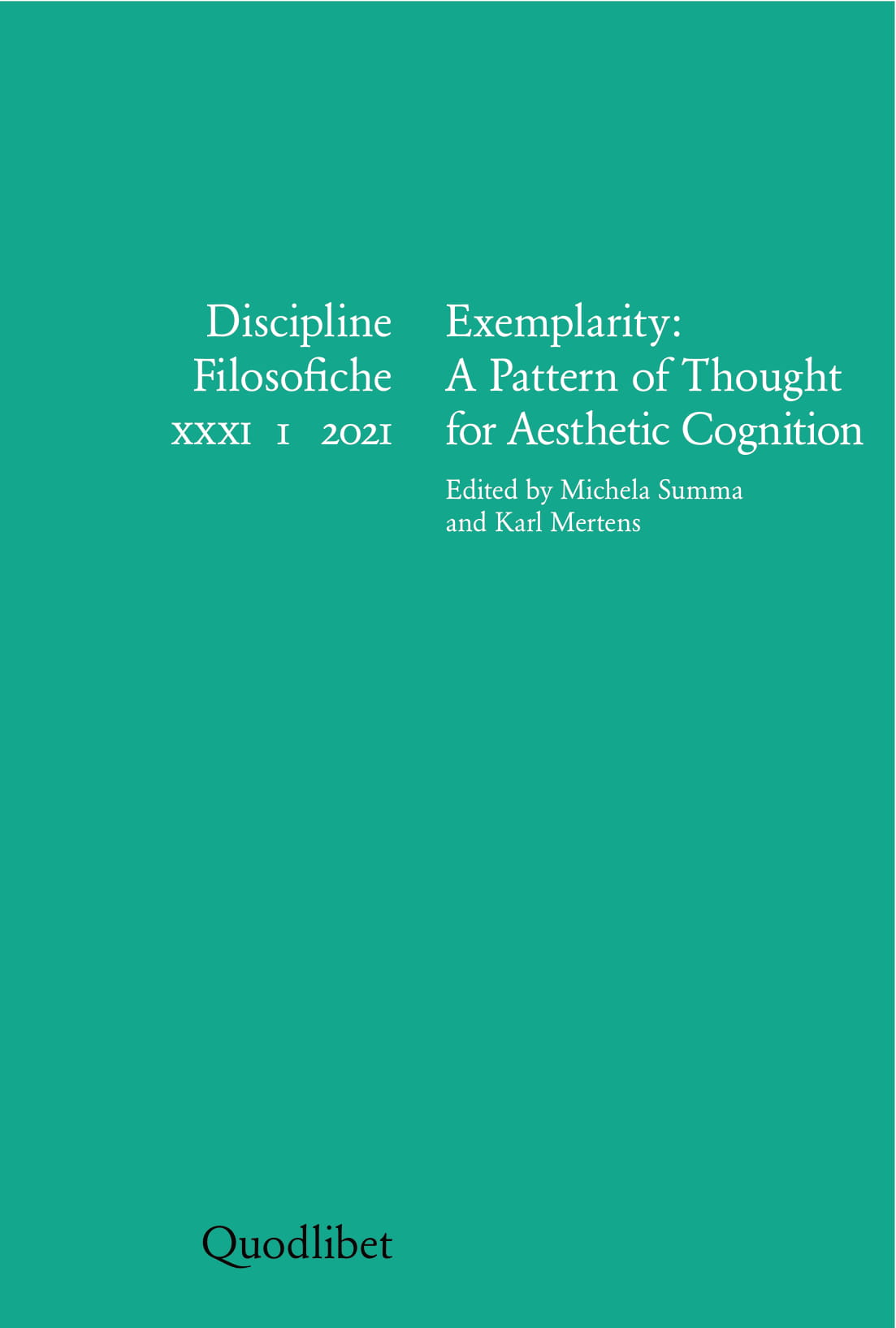XXXI, 1, 2021: Exemplarity: A Pattern of Thought for Aesthetic Cognition. Edited by Michela Summa and Karl Mertens
 Aesthetic experience is evaluative and emotional experience of artistic or natural singularities. Consistently, the systematic reflection on aesthetic experience accomplished in philosophical aesthetics and art theory also reflects this orientation towards singularities. However, the way in which we are directed to singularities in aesthetic experience needs some qualification. In contrast to what happens in everyday experience, in aesthetic experience, singularities assume an exemplary character. This means that such singularities also express something general that transcend them, that they can be taken as guides to grasp such generality, or that they inspire forms of communication tied to individual responsiveness and yet transcending individuality. The way in which aesthetic singularities can be said to be exemplary is not univocal. The contributions published in this issue of Discipline Filosofiche on “Exemplarity: A Pattern of Thought for Aesthetic Cognition” aim to shed light on what it means for aesthetic singularities to be exemplary and in what sense such exemplarity can be said to have a cognitive value.
Aesthetic experience is evaluative and emotional experience of artistic or natural singularities. Consistently, the systematic reflection on aesthetic experience accomplished in philosophical aesthetics and art theory also reflects this orientation towards singularities. However, the way in which we are directed to singularities in aesthetic experience needs some qualification. In contrast to what happens in everyday experience, in aesthetic experience, singularities assume an exemplary character. This means that such singularities also express something general that transcend them, that they can be taken as guides to grasp such generality, or that they inspire forms of communication tied to individual responsiveness and yet transcending individuality. The way in which aesthetic singularities can be said to be exemplary is not univocal. The contributions published in this issue of Discipline Filosofiche on “Exemplarity: A Pattern of Thought for Aesthetic Cognition” aim to shed light on what it means for aesthetic singularities to be exemplary and in what sense such exemplarity can be said to have a cognitive value.
This discussion is transversal to the meta-philosophical debate about the theoretical status of philosophical aesthetics and focuses on what aesthetics and art theory do when addressing exemplary singularities that generate aesthetic experience. The different senses in which singularities can be said to be exemplary refers to how, in relation to a given order, such singularities can be regarded as having an illustrative function or a guiding function: in this sense, we speak of examples as illustrations of a generality or of exemplars as guiding us to find a generality. However, the analysis of aesthetic experience shows how singularities can also be cases that contrast with a given order and that, acquiring an exemplary function, can even become the source for the institution of a new order. In this sense, focusing on the exemplarity of aesthetic experience also means focusing on the normativity of such experience. It is precisely the consideration of different normative functions of exemplary singularities in experience that leads to the recognition of a cognitive value of such experience – and thus legitimizes the discourse on aesthetic cognition.
One of the main outcomes of the reassessment of the singularity of aesthetic experience as exemplary singularities is an appraisal of the status of aesthetic cognition as critical inquiry. This implies a reconsideration of the discussions concerning criticism, the necessity and universality of aesthetic judgment, or the orientation provided by aesthetic productions. Such considerations are not simply concerned with a singular domain of human experience, related to aesthetic pleasure. Instead, they challenge the assumptions we make about the objective verifiability of our claims – be they philosophical, scientific, or ordinary – and prompt us to rethink the normativity of these claims, at least to some extent, in relation to how we may agree or disagree about them, and to how we deal with different kinds of disagreement. The importance of this approach lies primarily in recognizing that there are forms of cognitive normativity that do not refer to a universal principle or to given criteria for verification but must instead be constantly proved to be valid within experience itself and notably within social contexts. This is true of all the different kinds of examples that operate in aesthetic experience, insofar as they are all related to the communicative praxis of showing and exhibiting and to the meanings constituted on the basis of that praxis.
Reassessing the function of aesthetic exemplarity allows us to elevate our relation to the individual, to what is sensibly given, to the rank of a cognition that is not subordinate to further forms of abstract knowledge. In this sense, the exemplary character of aesthetic singularities makes aesthetic experience relevant for critical epistemology, while also allowing us to rethink the role of the aesthetic form of cognition in relation to moral and political action.
Contents
(click on the titles to view the abstracts)
Michela Summa, Karl Mertens, Introduction. Exemplarity: A Pattern of Thought for Aesthetic Cognition
Eva Schürmann, Die Verwirklichung des Allgemeinen im Konkreten. Über Kunst als Exemplifikation
Annapaola Varaschin, La normatività esemplare nell’estetica di Kant
Serena Feloj, Ästhetische Exemplarität und die Normativität des Geschmacks bei Kant
David Espinet, Lernen von der Kunst. Exemplarische Autonomie und praktische Einbildungskraft bei Kant
Elena Tavani, Exemplarity and Time. In the Wake of a (Kantian) Rule-in-Becoming
Dario Cecchi, L’arte della politica come performativo esemplare. Rileggendo le lezioni di Arendt sul giudizio estetico
Nicolas de Warren, Philosophical Ornamentation. The Exemplification of Ernst Bloch’s Spirit of Utopia in an Old Pitcher
Mirjam Schaub, Lucretia in the Writings of Augustine and Leibniz. A Complicated Philosophical Case Study that never Wished to Serve as an Example
Elisa Caldarola, Exemplification, Knowledge, and Education of the Emotions through Conceptual Art
Enza Maria Macaluso, La forma vivente come modello per l’esemplarità dell’immagine
Alfonso Di Prospero, Esperienza estetica, giustizia e inferenza induttiva

 Italiano
Italiano

